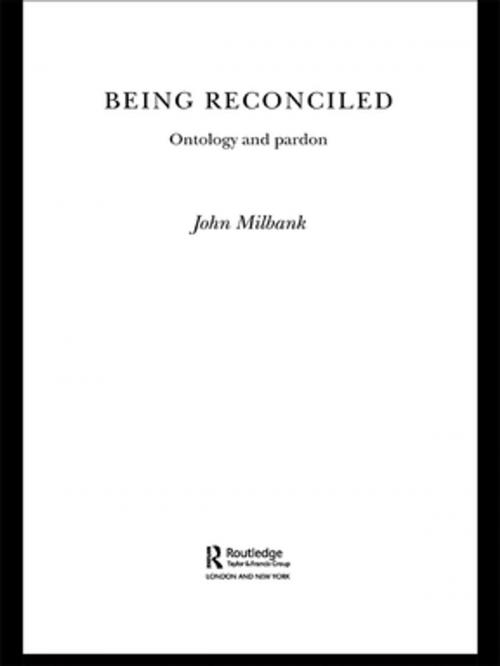| Author: | John Milbank | ISBN: | 9781134405893 |
| Publisher: | Taylor and Francis | Publication: | August 2, 2003 |
| Imprint: | Routledge | Language: | English |
| Author: | John Milbank |
| ISBN: | 9781134405893 |
| Publisher: | Taylor and Francis |
| Publication: | August 2, 2003 |
| Imprint: | Routledge |
| Language: | English |
Being Reconciled is a radical and entirely fresh theological treatment of the classic theory of the Gift in the context of divine reconciliation. It reconsiders notions of freedom and exchange in relation to a Christian doctrine which understands Creation, grace and incarnation as heavenly gifts, but the Fall, evil and violence as refusal of those gifts. In a sustained and rigorous response to the works of Derrida, Levinas, Marion, Zizek, Hauerwas and the 'Radical Evil' school, John Milbank posits the daring view that only transmission of the forgiveness offered by the Divine Humanity makes reconciliation possible on earth. Any philosophical understanding of forgiveness and redemption therefore requires theological completion.
Both a critique of post-Kantian modernity, and a new theology that engages with issues of language, culture, time, politics and historicity, Being Reconciled insists on the dependency of all human production and understanding on a God who is infinite in both utterance and capacity. Intended as the first in a trilogy of books centred on the gift, this book is an original and vivid new application of a classic theory by a leading international theologian.
Being Reconciled is a radical and entirely fresh theological treatment of the classic theory of the Gift in the context of divine reconciliation. It reconsiders notions of freedom and exchange in relation to a Christian doctrine which understands Creation, grace and incarnation as heavenly gifts, but the Fall, evil and violence as refusal of those gifts. In a sustained and rigorous response to the works of Derrida, Levinas, Marion, Zizek, Hauerwas and the 'Radical Evil' school, John Milbank posits the daring view that only transmission of the forgiveness offered by the Divine Humanity makes reconciliation possible on earth. Any philosophical understanding of forgiveness and redemption therefore requires theological completion.
Both a critique of post-Kantian modernity, and a new theology that engages with issues of language, culture, time, politics and historicity, Being Reconciled insists on the dependency of all human production and understanding on a God who is infinite in both utterance and capacity. Intended as the first in a trilogy of books centred on the gift, this book is an original and vivid new application of a classic theory by a leading international theologian.















